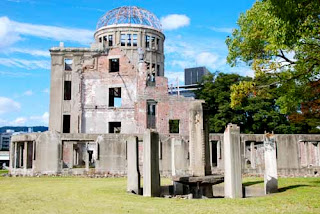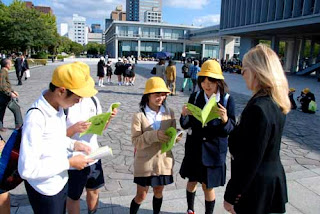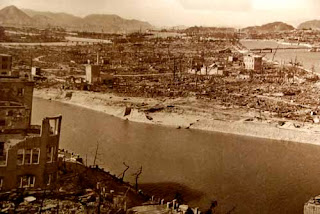 |
| Floating Torii Gate (Itsukushima-jinja) - Miyajima, Japan |
 |
| A-Bomb Dome - Hiroshima, Japan |
 |
| Japanese School Children - Hiroshima |
 |
| Children's Peace Monument - Hiroshima |
 |
| School Children Practicing English with Pat - Hiroshima, Japan |
 |
| After Atomic Bomb in 1945 - Hiroshima, Japan |
 |
| People After Atomic Bomb |
 |
| Giant Pot Eternal Flame (Is It Out?) - Miyajima, Japan |
 |
| World's Largest Rice Paddle - Miyajima, Japan |
Hiroshima is a nice Japanese city to visit and very interesting to learn about the overwhelming devastation of atomic warfare.
At 8:15 am on August 6, 1945, the first atomic bomb was exploded over Hiroshima leveling the city for miles. This dreadful event leveled 40% of the Hiroshima's buildings and killed 140,000 people (of a then population of 350,000) with thousands more dying later from related causes.
Today with a population of over one million, you would not know anything happened here because now Hiroshima is a very vital modern Japanese city with wide boulevards (rare in Japan) and everything is less than 60 years old.
Hiroshima has a large Peace Memorial Park dedicated to the elimination of nuclear weapons. The A-Bomb Dome (see photo) is the remains of a building at ground zero and the only remaining evidence of the enormous damage.
A 10-year old Japanese girl who developed leukemia after the atom bomb dropping inspired the Children’s Peace Monument. She decided to fold 1,000 paper cranes (a Japanese custom believing wishes come true). She died before completing the task. Thousands of folded paper cranes are brought to Hiroshima every year.
The well-done Peace Memorial Museum is the famous sobering symbol of the idiocy of war. We all know the reasons for the use of the atomic bomb but seeing the evidence (see photo) of burned bodies with flesh dripping from arms held out makes the reality of the event more human. And to think today we have nuclear weapons over 3,300 times more powerful!
By the way, the museum also details the reasons that the Japanese brought this tragedy on themselves. Japan was responsible for horrible war crimes and Hiroshima was home to Japan’s military command as well as a major military ship building center.
The second day we took a day trip just outside of Hiroshima to Miyajima (Itsuka-shrima) - the floating torii gate of Itsukushima-jinja (see photo). This is one of the most famous scenes in Japan and is on thousands of Japanese travel brochures. We had the rare opportunity to witness the floating torii gate of Itsukushima-jinja at high tide - a beautiful sight.
We also hiked up the Misen hill to see the hilltop temples and giant pot used by the Buddhist saint, Kobo Daishi said to have been kept continuously simmering since 774. We think we saw the flame out. You be the judge (see photo). Back in Mijajima we saw the world’s largest rice paddle (see photo).
Please
also see our 10 other blog posts for wonderful Japan:
Travel for half the cost for all levels of travel from budget to luxury and 100's of other unique travel tips! From a
former Economic professor, experienced traveler
(106 countries), award-winning travel photojournalist/blogger, featured speaker at large travel shows,
host of the travel TV show Plan Your Escape® TV aired on the CW network,
and travel columnist for the Huffington Post, our popular 5-star customer rated groundbreaking and comprehensive how-to world travel book Plan Your Escape, Secrets of Traveling the World for Less Than the Cost of Living at Home
reveals secrets how you can travel and see more for half the cost for all
trips, experience more adventure
and romance, safely realize your travel dreams with comprehensive planning tools and checklists, travel the world for less
than $100/day for a couple, and much more!



No comments:
Post a Comment
We love to hear from you!